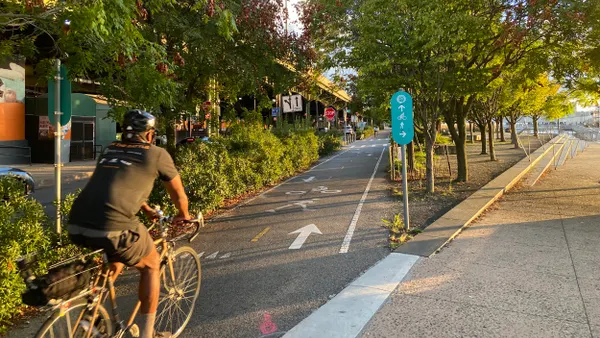Dive Brief:
- The California State Senate passed a bill 36–2 on Monday that would require safety operators onboard autonomous trucks, whereby a state report and legislative approval would be needed to reverse that.
- The bill, AB 316, restricts testing on public roads and puts a significant barrier into how quickly AV trucking firms can commercialize the technology. California has yet to allow trucks weighing 10,001 pounds or more to be driven autonomously on public roads.
- The pending law, which drew support from the International Brotherhood of Teamsters and opposition from the Autonomous Vehicle Industry Association (AVIA), now goes before the governor for signing.
Dive Insight:
The Golden State serves as a key link for freight and home for AV firms such as Aurora Innovation, Kodiak Robotics and TuSimple Holdings.
Those firms and others such as Gatik, Volvo Autonomous Solutions and Waabi are developing autonomous trucking services but stand to face delays in implementing new capabilities there and in interstate routes involving the state.
AVIA, which represents those companies, urged California Gov. Gavin Newsom to veto the bill. “We are disappointed to see AB 316 pass the California Senate,” the organization said Monday in a statement.
Union representatives hailed the measure Monday, saying that legislators stood up for drivers’ jobs, the California Teamsters Public Affairs Council said on the social media platform X, formerly known as Twitter.
Jason Rabinowitz, president of Teamsters Joint Council 7, said in a statement that the signing of the bill into law “should be a no-brainer.”
Supporters and opponents both argued that the matter related to safety.
“While self-driving technology could be promising in the future, it is simply not there yet for widespread and expanded use into heavy-duty trucks,” Sen. Brian Jones, R-San Diego, said before the vote. “When public safety is at risk, we need to pump the brakes until it is perfected.”
Voices such as AVIA have said the technology will reduce crashes, whereas critics raised concerns on whether heavy-duty AVs would be rolled out too quickly.
Sen. Steve Glazer, D-Contra Costa, compared the matter to typewriters and horse-drawn carriages, saying technology makes people’s lives easier and the status quo shouldn’t restrict advancements. “Nobody wants trucks on the roads that aren’t safe,” he said.
Opponents of the bill also argued that the state’s Department of Motor Vehicles should have oversight, but the bill calls for legislators to take a more active role.
The legislation requires the DMV to issue a report about AV technology and its impact, including effects on public safety and jobs, for autonomous vehicles weighing 10,001 pounds or more.
The report must be issued by “Jan. 1, 2029, or five years after commencement of testing, whichever occurs later.” Following the report and a legislative oversight hearing, the DMV could permit driverless autonomous vehicle one year later, provided legislators and the governor approve the measure.
The pending law would also require crash reports from companies to the state’s DMV as well as annual reports on whether an AV’s autonomous mode is deactivated, such as when an operator needs to take over driving.












